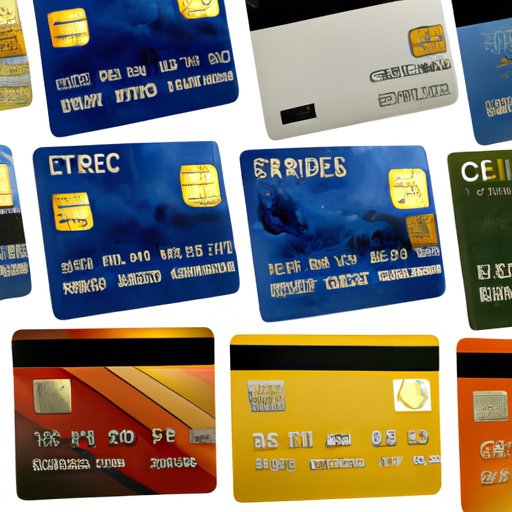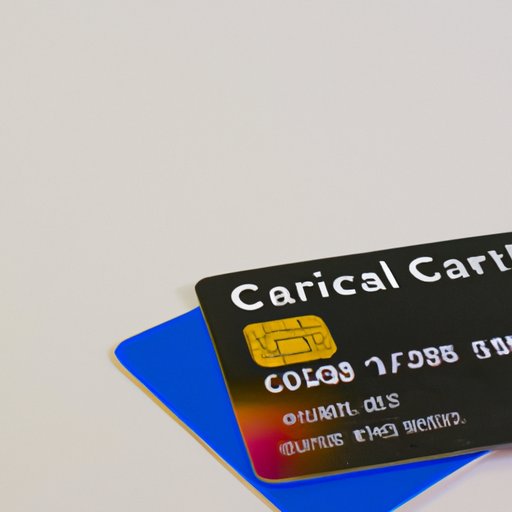Introduction
A credit card is a payment method that allows you to make purchases on credit, up to a certain limit. Credit cards are issued by banks or other financial institutions and can be used anywhere that accepts credit cards as a form of payment. Credit cards are an important part of personal finance and can be a great way to build credit and take advantage of rewards programs.
What is a Credit Card?
A credit card is a type of loan that is issued by banks and other financial institutions. When you use a credit card, you are borrowing money from the issuer and agreeing to pay it back over time, with interest. Credit cards give consumers the ability to make purchases without having to pay right away. This makes them a convenient way to purchase goods and services, but also carries some risks, such as potential for debt and higher interest rates.

Overview of the Different Types of Credit Cards
There are many different types of credit cards available, each offering different features and benefits. Some of the most common types of credit cards include:
- Standard credit cards – These cards have no annual fee and typically offer lower interest rates than other types of credit cards. They may also offer rewards programs, such as cash back or points.
- Reward credit cards – These cards offer rewards for making purchases, such as cash back or travel miles. They usually have an annual fee and higher interest rates.
- Secured credit cards – These cards require a deposit that serves as collateral in case you default on your payments. They typically have low credit limits and high interest rates.
- Balance transfer cards – These cards allow you to transfer existing balances from one card to another, usually at a lower interest rate. They may have an annual fee and may not offer rewards programs.

Explaining the Basics of Credit Card Use
Credit cards can be a powerful tool for managing your finances, but it’s important to understand how they work in order to use them responsibly. Here are some basic tips for using credit cards:
How to Make Purchases with a Credit Card
Making purchases with a credit card is easy. All you need to do is present your card at the point of sale or enter your card information online. Your credit card issuer will then approve the purchase and send you a bill for the amount you owe.
Understanding Interest Rates and Fees
When you use a credit card, you will be charged interest on any balance you carry. The interest rate and fees vary depending on the type of credit card you have. It’s important to read the terms and conditions of your credit card to understand what you’ll be charged for carrying a balance.
Strategies for Managing Credit Card Debt
It can be easy to get into credit card debt if you’re not careful. To avoid getting into too much debt, it’s important to make sure you only spend what you can afford. You should also pay off your balance in full every month to avoid paying interest. If you find yourself in debt, there are strategies you can use to manage it, such as transferring your balance to a lower interest rate card or talking to your credit card issuer about setting up a payment plan.
Benefits of Using Credit Cards Wisely
Using credit cards responsibly can help you build a good credit history and take advantage of rewards programs. Here are some of the benefits of using credit cards wisely:
Building Credit History
Using a credit card responsibly can help you build a good credit history. This can be beneficial when you apply for loans or other forms of credit in the future. To build a good credit history, you should always make your payments on time and keep your balance low.
Secured Credit Cards
Secured credit cards are a great option for people who don’t have a good credit history or who want to rebuild their credit. With a secured credit card, you must put down a deposit that is equal to the credit limit on the card. This ensures that the credit card issuer won’t lose money if you default on your payments. Secured cards often have lower interest rates and fewer fees than other types of credit cards.
Cash Back Rewards Programs
Many credit cards offer cash back rewards programs that allow you to earn cash back on your purchases. The amount you can earn varies depending on the card, but it can be a great way to save money on everyday items. To maximize your rewards, it’s important to read the terms and conditions of your card carefully and understand how the program works.

Tips for Choosing the Right Credit Card
Choosing the right credit card can be confusing, so it’s important to do your research before applying. Here are some tips for choosing the right credit card:
Research Different Credit Cards
Start by researching the different types of credit cards available. Compare the interest rates, fees, and rewards programs to find one that best fits your needs.
Compare Interest Rates and Fees
Interest rates and fees can vary greatly between different cards, so it’s important to compare them before you apply. Look for cards with low interest rates and no annual fees.
Consider Your Spending Habits
Think about how you plan to use the card and choose one that offers rewards that match your spending habits. For example, if you travel often, look for a card that offers travel miles or discounts on airfare.
How to Utilize Credit Card Rewards Programs
Credit card rewards programs can be a great way to save money, but it’s important to understand how they work. Here are some tips for taking advantage of credit card rewards:
Types of Credit Card Rewards
The type of rewards offered by credit cards vary widely. Common types of rewards include cash back, points, and travel miles. Read the terms and conditions of your card carefully to understand what type of rewards you can earn.
Maximizing Credit Card Rewards
In order to maximize your rewards, it’s important to use your card regularly and pay off your balance in full each month. You should also take advantage of special offers and promotions offered by the card issuer.
Understanding Terms and Conditions
Reading the terms and conditions of your card is essential in order to understand the rules of the rewards program. Be sure to read the fine print and ask questions if you don’t understand something.
Conclusion
Credit cards can be a powerful tool for managing your finances, but it’s important to understand how they work in order to use them responsibly. By understanding the basics, exploring the benefits, and utilizing credit card rewards programs, you can use credit cards wisely and get the most out of them.
In summary, credit cards are a convenient way to make purchases, but can also come with risks. There are many types of credit cards available, each offering different features and benefits. To use credit cards wisely, it’s important to understand interest rates and fees, as well as strategies for managing credit card debt. Additionally, using credit cards responsibly can help you build a good credit history and take advantage of rewards programs. Finally, it’s important to research different cards and understand the terms and conditions of the rewards program in order to get the most out of your credit card.
(Note: Is this article not meeting your expectations? Do you have knowledge or insights to share? Unlock new opportunities and expand your reach by joining our authors team. Click Registration to join us and share your expertise with our readers.)
